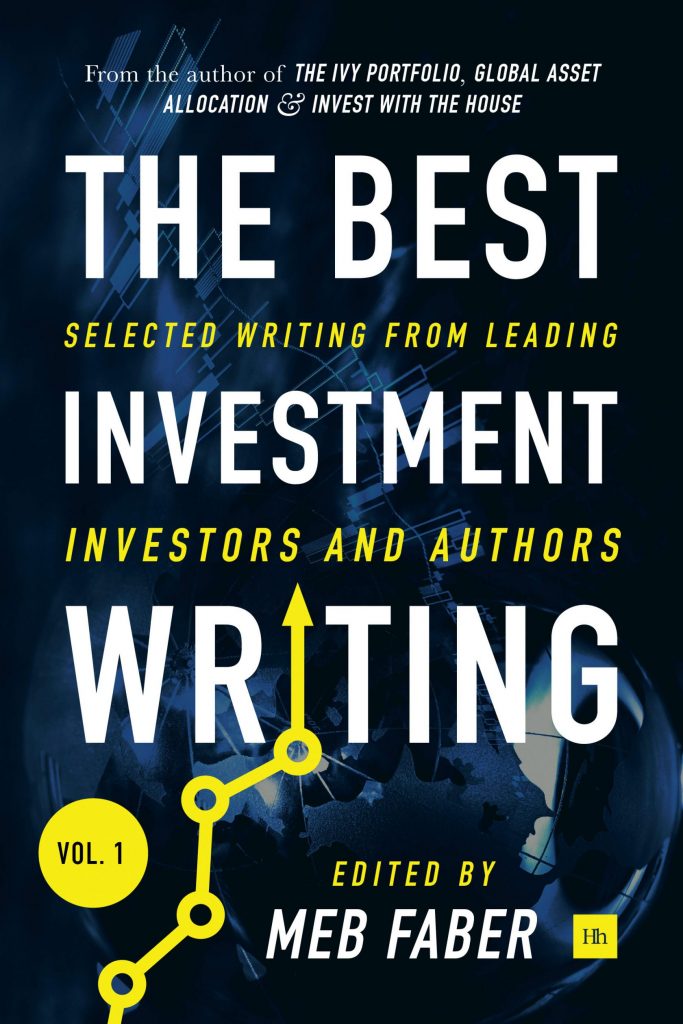I was pleasantly surprised to be invited to contribute a chapter to this book.? I am going to encourage you to buy this book, but let me give some of the reasons not to buy this book:
- Don’t buy it to give me something.? I don’t get anything from sales of this book.? Neither does Mebane Faber, who is giving all of the profits to charity.
- Don’t buy it to read my article.? You can read it for free here.? Better, you can read the updated version of the article, which I publish quarterly, here.? (Those reading this at Amazon, there are links at my blog.? Google “Alephblog The Best Investment Writing” to find them.)
- Don’t buy it to get current ideas.? There are none here.? The weakness of the book is that the articles are dated by 9-21 months or so, BUT… that doesn’t keep the book from being relevant.
- Don’t buy it if you want one consistent theme.? It’s like reading RealMoney.com, except with a broader array of authors.? There is no “house view.”
- Don’t buy it for the graphics in the book.? The grayscale images in the book are good for black & white, but some are hard to read.? The graphs for my article are far better at my blog.
The book is a good one because there is something for everyone here.? Do you want quantitative finance?? There is a good selection here. Do you want good basic articles about how to think about investing?? There are a good number of those as well, particularly from well-known financial journalists, and some of the most well-regarded bloggers.? Do you want a few unusual articles that might cause you consider some asset sub-classes or techniques that you haven’t considered before?? They are here too.
The writers fall into four buckets — journalists, asset managers, pundits/authors, and those who sell information at their websites.? I will tell you that my personal favorites from this volume are Tom Tresidder, Mebane Faber, Chris Meredith, Ben Carlson (how was he the only one with two articles in the book?), Jason Hsu & John West, and Cullen Roche.
Don’t get me wrong, I like almost all of the authors in this volume, and am proud to be featured among them.? For a number of them, though, I would have picked other things they have written in 2016 that had more punch, and offered more of a difference in perspective.
Why buy this?? After you read this, you will be a smarter, more well-rounded investor.? In my calculations, that’s? pretty good — 32 articles that will take you 4 hours to read.? Got seven minutes?? Read an article; it just might help you a great deal.
Quibbles
Already stated, though if you don’t like statistics, one-third of the articles may not appeal to you.? Also, a few articles veer into political commentary (not that I would ever do that 😉 ).
Summary / Who Would Benefit from this Book
Though almost anyone could benefit from this book, it is geared toward investors with intermediate-to-higher levels of knowledge and experience.? If you want to buy it, you can buy it here:?The Best Investment Writing: Selected writing from leading investors and authors.
Full disclosure:?I received two free copies of the book for contributing the article.? That’s all, unless someone buys the book through the link above.
If you enter Amazon through my site, and you buy anything, including books, I get a small commission. This is my main source of blog revenue. I prefer this to a ?tip jar? because I want you to get something you want, rather than merely giving me a tip. Book reviews take time, particularly with the reading, which most book reviewers don?t do in full, and I typically do. (When I don?t, I mention that I scanned the book. Also, I never use the data that the PR flacks send out.)
Most people buying at Amazon do not enter via a referring website. Thus Amazon builds an extra 1-3% into the prices to all buyers to compensate for the commissions given to the minority that come through referring sites. Whether you buy at Amazon directly or enter via my site, your prices don?t change.


One thought on “Book Review: The Best Investment Writing, Volume 1”